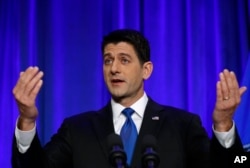President-elect Donald Trump will have Republican majorities in both houses of Congress when he assumes office in January, boosting chances for enacting major items on his agenda.
"The stalemate and deadlock that's gone on with a Democratic president and a Republican Congress probably won't exist next year when Trump is president," said federal budget analyst and political observer Stan Collender. "There's a variety of things from tax reform to major tax cuts to infrastructure spending that will probably get through [Congress] relatively quickly."
Republicans are assured at least 51 seats, and possibly as many as 53, in the 100-member Senate, and at least a 41-seat majority in the 435-seat House of Representatives. Just weeks ago, Democrats sounded confident of winning the Senate and thought they had a fighting chance of taking the House.
'Beyond coattails'
The forces Trump marshaled to win the presidency saved numerous vulnerable Republican lawmakers as well, according to observers.
"It went beyond coattails," said Norman Eisen of the Brookings Institution, referring to a presidential candidate's ability to carry his party's legislative candidates to victory. "The guy [Trump] had a train on a wedding dress.
"He bailed the Senate out. The thinking was that Democrats were likely to take control of the Senate. Republicans reversed that. The Trump base that turned out carried the day in the Senate," added Eisen, who served as a special counsel for government reform in the Obama administration.
For now, some of Trump's fiercest congressional critics, Democratic and Republican, are sounding a conciliatory note.
"We have a responsibility to come together and find common ground," House Democratic leader Nancy Pelosi of California said in a statement. "The peaceful transfer of power is the cornerstone of our democracy."
"My family and I congratulate President-elect Trump on his decisive victory," Republican Senator Ben Sasse of Nebraska said in a statement. Sasse had been among the first Republican lawmakers to disavow Trump earlier this year.
"My family and I just prayed that President-elect Trump will be wise and faithful in his new vocation," Sasse tweeted. "We call on all Americans to do as well."
House Speaker Paul Ryan of Wisconsin, who reluctantly endorsed Trump and occasionally traded barbs with his party's presidential nominee, said Wednesday, "Donald Trump heard a voice out in this country that no one else heard. He connected in ways with people no one else did. He turned politics on its head, and now Donald Trump will lead a unified Republican government. We will work hand-in-hand on a positive agenda to tackle this county's big challenges."
Observers said Trump's relationship with Ryan and other powerful Republican lawmakers going forward was an open question.
Things 'could get ugly'
"If you heard Trump's speech last night, he reached out to other Republicans as much as Democrats to say, 'I want to work with you,' " said Collender. "But Trump is a pretty vindictive person, and that could get ugly pretty quickly."
"The first couple of things we'll see Congress tackle are things on which Trump and congressional Republicans have a pretty clear consensus: tax cuts, an effort to repeal all or part of the Affordable Care Act, deregulation," said political analyst Molly Reynolds of the Brookings Institution, a Washington policy research group.
But Eisen noted that President Barack Obama enjoyed bigger Democratic legislative majorities for the first two years of his administration, yet struggled mightily to enact major legislation like a stimulus package and the Affordable Care Act, also known as Obamacare. He predicted Trump would face similar hurdles.
"It's not a huge [Senate Republican] majority," Eisen said. "There has not been 100 percent Republican falling in line behind Trump. There are going to be leadership issues, because the House Republican caucus is fractured. There will be challenges even with one-party rule."
But the picture is far from bleak for portions his agenda, particularly on fiscal maters. When it comes to tax cuts, Trump will benefit from Senate rules that allow budgetary items to pass with a simple majority, not the three-fifths supermajority typically required for bills to clear the chamber. Should Republicans maintain unity behind Trump's fiscal plan, Democrats will be hard-pressed to prevent it from becoming law.
WATCH: Senate Majority Leader McConnell Discuss Trump, High Court
Before the election, some Republican senators had hinted they might take up Obama's Supreme Court nominee, Merrick Garland, if Clinton won. Now, the high court vacancy will be filled by a jurist of Trump's choosing.
"That will be a very early priority of the new administration and the new Senate," Reynolds said. "The same reasons why we thought that a Democratic president would be able to reshape the court hold for a President Trump.
"It's less likely that some of the more liberal justices would choose to retire with Trump in the White House. But several of them are getting on in years, and as we saw in February with the unexpected death of Justice [Antonin] Scalia, we never quite know when a vacancy will appear," she added. "If there is more than just the one vacancy that currently exists on the court, we certainly could see a Trump administration influential in shaping how the Supreme Court looks for years to come."









